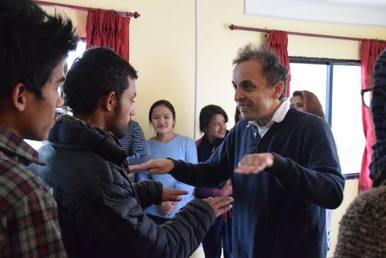They also have been urged to develop leadership skills that gives them the confidence to implement new social practices in their community This is very hard for students who have been through their schooling, in a very old fashioned method, studying by rote.
I was working with first year students, only a few months in the course. Few had performing arts experience, so a drama class was something very new for them. Thus when I met them at the beginning of class their apprehension was palpable.
We started with basic games that are tried and true ways to break the ice. After a few minutes they could not help them selves and the laughter exploded. The simple idea behind these games is for participants to loose their nerves and find the pleasure in playing, rediscovering what they would have done as children.
I divide the students into groups and I get them to create one animal per group. They only have a few minutes, so they learn to work co-operatively very quickly. They have to come up with something; good bad or indifferent and then show the rest of the group.
I then ask them to walk around the space leading with different parts of the body and notice if they feel different. For example feeling more confident, if they had their back straight and chest forward, or shy with their chest in.
We worked on projecting the voice so they could be heard clearly without being dependant on a microphone.
This leads to status games. Status is a huge social issue in Nepal and India. The cast system is of course very prevalent, causing entrenched discrimination. The role- play improvisations that continue after the movement and voice exercise are able to reflect issues such as master and servant, teacher and student, wife, groom and mother –in-law They end the workshop rehearsing and then showing skits that shine a light on them.
The students found the workshop very enjoyable and liberating. I hope it gives them some confidence in working with their communities.

 RSS Feed
RSS Feed
